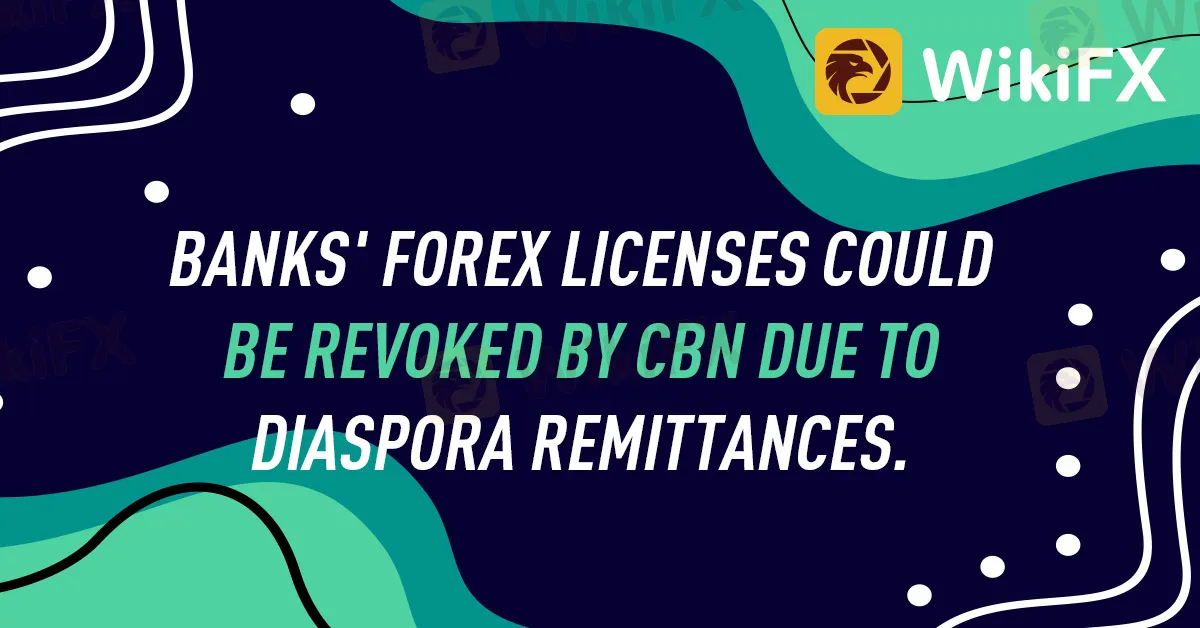Celebrate the New Year and Usher in a Safer 2026 for All Traders!
As the new year begins, WikiFX extends our sincere gratitude to traders worldwide, our industry partners, and all users who have consistently supported us.
简体中文
繁體中文
English
Pусский
日本語
ภาษาไทย
Tiếng Việt
Bahasa Indonesia
Español
हिन्दी
Filippiiniläinen
Français
Deutsch
Português
Türkçe
한국어
العربية
Abstract:Yesterday, the Central Bank of Nigeria (CBN) threatened to revoke the foreign exchange dealership licenses of banks that work with International Money Transfer Operators (IMTOs) in order to go against its order that recipients of diaspora remittances be paid in the currency of their choosing.

Yesterday, the Central Bank of Nigeria (CBN) threatened to revoke the foreign exchange dealership licenses of banks that work with International Money Transfer Operators (IMTOs) in order to go against its order that recipients of diaspora remittances be paid in the currency of their choosing.
The CBN had instructed that recipients of such remittances to be paid in dollars through the selected banks of their choosing in a November 2020 circular to banks in an effort to increase diaspora remittances, particularly through the banking system.
In contrast, the apex bank stated in a circular to banks yesterday that some IMTOs violate this instruction by sending diaspora remittances in Naira through banks and engaging in illicit operations.
The CBN's attention has been raised to the growing illegal activities by Money Transfer Operators in Nigeria, through banks, by terminating payments in Naira contrary to existing regulations, according to a circular signed by the director of the Trade and Exchange Department, Ozoemena Nnaji. Some banks participate in this dishonest conduct by collaborating with unregistered foreign money transfer companies that conceal their activities and carry them out through regional interbank transfers.
From this point forward, any bank discovered to be encouraging an IMTO or unregistered operator to engage in this activity would face appropriate sanctions.
Additionally, we want to remind all banks that it is their duty to understand not only their customers' identities but also their clients' businesses (KYCB. requirements).
For the avoidance of doubt, all banks and IMTOs are to adhere to the rules on international money transfer operations published by the Bank and pay the proceeds of diaspora remittance only in US Dollars.
Any bank that is discovered helping or working with IMTOs to stop remittances in naira would have their authorized dealership license revoked.
The Central Bank of Nigeria has pledged to penalize international money transfer operators (IMTOs) that continue to send money back home in the local naira despite its order.
The bank claimed that in an effort to expand the foreign exchange market and foster transparency in the management of diaspora remittances into Nigeria, IMTOs and commercial banks in the nation pay beneficiaries of remittances in foreign currencies.
Later, it issued a warning to businesses and banks that were continuing to send money abroad in naira despite the directive and threatened “serious penalties” for those found out.
Since the implementation of the new strategy, the naira has recovered after previously falling due to a lack of foreign exchange supply in the parallel market.
Operators like Western Union, Moneygram, and World Remit, which previously paid recipients of remittances in naira, have generally cooperated, aiding in the expansion of the dollar supply in the nation.
However, the central bank claimed in its letter on Friday that some IMTOs and unlicensed businesses had continued to send money back to Nigeria from the diaspora in naira, in flagrant defiance of its order that all remittances be made to recipients in dollars.
The regulatory body stated that anyone or any institution found to be directly violating these rules will face severe penalties, “including removal of operational licenses.”
The CBN “must not hesitate to authorise the closure of their accounts in Nigerian banks, including being prohibited from using banking services in Nigeria,” the bank stated.

Disclaimer:
The views in this article only represent the author's personal views, and do not constitute investment advice on this platform. This platform does not guarantee the accuracy, completeness and timeliness of the information in the article, and will not be liable for any loss caused by the use of or reliance on the information in the article.

As the new year begins, WikiFX extends our sincere gratitude to traders worldwide, our industry partners, and all users who have consistently supported us.

Dear Forex Traders, When choosing a forex broker, have you ever faced these dilemmas? Dozens of broker advertisements, but unsure which one is truly reliable? Online reviews are either promotional content or outdated/incomplete? Want to learn about real users’ deposit/withdrawal experiences but can’t find firsthand accounts? Now, your experience can help thousands of traders and earn you generous rewards! The campaign is long-term and you can join anytime.

Markets turn cautious as investors await the Fed’s December meeting minutes. The US Dollar stabilizes near 98.10, gold drops sharply from record highs, while GBP/USD, EUR/USD, and USD/JPY react to central bank signals.

To further enhance the sense of participation and belonging among members of the Elite Club in the Middle East and North Africa (MENA) region, and to raise awareness regarding the safety and compliance of forex trading in the regional market, WikiFX successfully held the themed content series “Elites’ View in Arab Region” from November 28 to December 28, 2025. The theme was “The First Line of Defense for Forex Safety: Education First, Jointly Promoting Healthy Forex Development."
